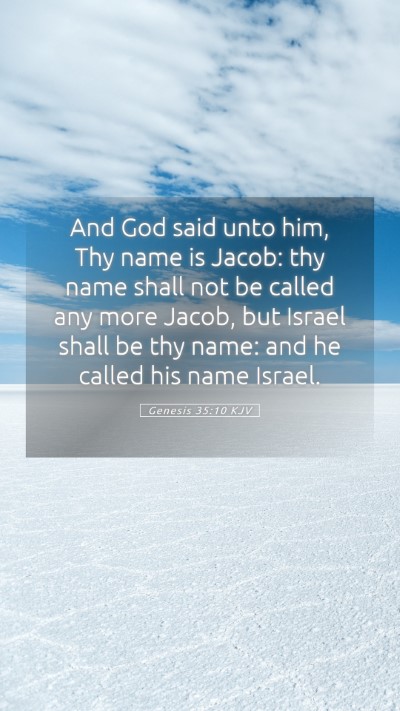Understanding Genesis 35:10
Genesis 35:10 states, "And God said unto him, Thy name is Jacob: thy name shall not be called any more Jacob, but Israel shall be thy name: and he called his name Israel." This pivotal moment in scripture carries profound significance, and various public domain commentaries provide insight into its deeper meanings.
Meaning of Genesis 35:10
The renaming of Jacob to Israel signifies a transformation that reflects a deeper covenant between God and His people. Here we explore the theological implications of this verse:
Theological Significance
- Identity Transformation: The change from Jacob (meaning "supplanter") to Israel (meaning "he who struggles with God") is symbolic of Jacob's spiritual growth and his struggle to align with God's will. Matthew Henry emphasizes this new identity as a representation of God's sovereignty and grace.
- Covenantal Relationship: This name change underscores the establishment of a covenant relationship between God and Jacob, who becomes the father of the nation of Israel. Albert Barnes notes this as a pivotal moment in the redemptive history of mankind.
- Divine Encounter: Adam Clarke points out that this renaming occurs after a direct encounter with God, highlighting the transformative power of God's presence in one's life. Clarke stresses the importance of personal encounters with God, which can lead to profound changes in identity and purpose.
Contextual Analysis
Understanding the historical context of Genesis 35:10 is essential for a comprehensive interpretation. The events following Jacob's return to Bethel, where he previously encountered God, are pivotal. This highlights God’s continuing method of revealing Himself and establishing His covenant. The mention of Jacob’s struggles also reflects the broader struggles of Israel as a nation.
Practical Applications
The transformations seen in Jacob's life invite personal reflection. For believers today, this verse can inspire:
- Embracing Change: Just as Jacob's identity was transformed, individuals are encouraged to embrace changes in their lives brought forth by faith.
- Struggling with Faith: Jacob's wrestling with God mirrors the struggles many face in their faith journey, acknowledging that wrestling with doubt or challenges can lead to deeper spiritual insights.
- Covenantal Relationship with God: Recognizing one's status as a child of God can deepen one's relationship with the divine. Reflecting on how God's promises unfold in one’s life can lead to a renewed sense of identity.
Related Cross References
To enrich the understanding of Genesis 35:10, consider studying the following related verses:
- Genesis 32:28: "And he said, Thy name shall be called no more Jacob, but Israel: for as a prince hast thou power with God and with men, and hast prevailed."
- Genesis 17:5: "Neither shall thy name any more be called Abram, but thy name shall be Abraham; for a father of many nations have I made thee."
- Exodus 3:14: "And God said unto Moses, I AM THAT I AM: and he said, Thus shalt thou say unto the children of Israel, I AM hath sent me unto you."
Conclusion
The analysis of Genesis 35:10 through the lens of public domain commentaries reveals a multi-faceted understanding that goes beyond mere words. As one seeks Bible verse meanings and interpretations, this verse stands as a testament to the transformational power of God in establishing identity and covenant. Studying this verse can enrich Bible study groups or personal spiritual journeys by providing profound insights into God’s relentless pursuit of humanity.


